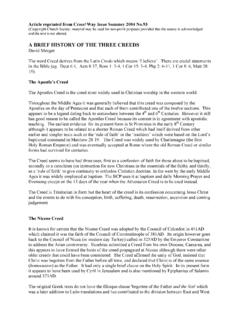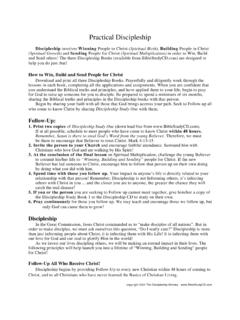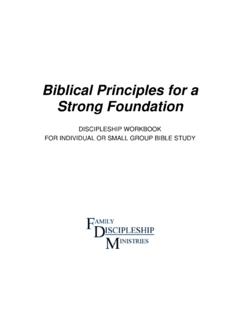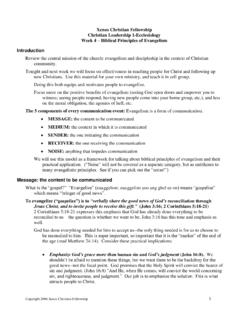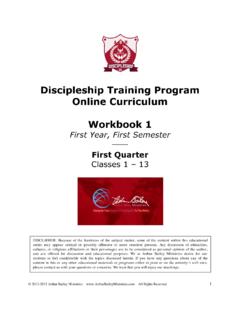Transcription of Biblical Principles of Leadership - Church Society
1 Clergy AppointmentsBiblical Principlesof LeadershipChurch Society TrustDean Wace House, 16 Rosslyn Road, Watford, Herts,WD18 ONYTel : +44 (0) 1923-235111 Fax : +44 (0) 1923-800362E-mail : Society Trust holds patronage rights on behalf of Church Society which is a voluntary association of members of the Church of England. Church Society exists to uphold Biblical teaching and to promote and defend the character of the Church of England as a reformed and national Church . The Society is strongly committed to the supreme and final authority of the Bible as God's Word information about Church Society and many other resources can be found on our about the work of Church Society Trustcan also be reached Church Society 2008diverse ways in which Leadership was exercised. Nevertheless, in the New Testament Church and beyond there were particular people - the elders / presbyters - who had a particular role of Leadership .
2 As our practice has developed in the Church of England it is priests/presbyters who correspond most closely to the Biblical role. Before leaving the nature of Leadership it needs to be said that there is one final feature of Christian Leadership which is also modelled on Christ - bearing the cost. Whether in small measure or large, leaders will have to drink the cup of Christ (Mt ). Indeed, history shows that when the Church has been persecuted it is often the leaders who have suffered first for the name of scripture the primary focus of Leadership is not on Church government but on service, pastoring the flock and teaching. At its best in history, that is what Christian ministry, in its many and various forms, has aspired to. There is therefore much to be concerned about today. Many of the models of Leadership being promoted today do not have the primary roots in the scriptures.
3 Some seem to treat the Christian minister as the same as a manager in a business, whilst others give all the appearance of seeing ministry as a spiritualised form of Social Work. We are in danger of borrowing too much from the world around us - Jesus warned his disciples about this (Mt ) - when our primary model must be Christ. The temptation is to take on the models of Leadership used in professions or in industry. There is much talk today of contracts, appraisal, career paths, remuneration packages. Sometimes when churches advertise for their next minister it sounds more like a specification for a managing director of a company than for a minister of the gospel. If these things are of any importance they must be secondary and those who lead should be more concerned with imitating Christ - as servants, shepherds, Biblical Requirements for have used the term presbyter in this document because it is a word found in the Bible (the Greek being presbuteros) and from this word, through Anglo-Saxon our modern English word priest is derived.
4 Unfortunately there is also a long tradition of using the English word priest to translate a different Biblical word (in Greek hiereus) which is used to refer both to the priestly line in Israel and the pagan priests in the Graeco-Roman world of the New Testament. Properly speaking the English word priest means presbyter, that is an elder and was a term and role already familiar in the synagogues out of which the early Christian communities sprang. In the New Testament the word presbyter seems interchangeable with another word, overseer (Greek episcopos) as can be seen from Titus & writing to both Timothy and Titus the Apostle Paul sets out qualifications and standards expected of those to be presbyters. These standards have been accepted by the Church through the ages as being enduring and not just specific to that time.
5 Whilst no-one is perfect yet the Church should seek to ensure that those appointed to its public ministry match as closely as possible these standards. Clearly such discernment should be taking place in relation to selection for ministry and ordination but sadly not everyone in the Church of England is prepared to accept the Biblical standards or even those set out in The Ordinal. Moreover clergy do change for better and sometimes for ill. Therefore, it is essential that those involved in parochial appointments see it as their duty to ensure that candidates do match, as far as humanly possible, the Biblical is immediately striking from the person described by Paul in both places is the almost total lack of ability. Only two abilities are required, and these are not , the presbyter must be able to govern his own household well, because he will have to govern a Church .
6 A Vicar or Rector in the Church of England is not a mini-dictatorship; partnership in the gospel is essential and this means allowing people to use gifts, whilst at the same time recognising that part of the role of a presbyter is to govern. Done well this will be largely unobtrusive and congregations and 10,000 members like many modern nature of were to be leaders in the Christian Church , but what was the nature of their Leadership ? The following is not exhaustive, but it covers the main is to be modelled on Christ (1 Cor ). This must shape every other facet of Christian are to be servants (eg. 2 Ti ). Jesus gave this model particular shape when he washed his disciples feet. Though the leaders of the gentiles lord it over them, that is not to be the way with the leaders of the people of Christ. The leader is to be the servant of are shepherds (Acts ).
7 They are to take heed to the flock of which the Holy Spirit has made them overseers. Like the Good shepherd himself the leaders must feed and nurture both sheep and , the leader is also a teacher (1 Ti ). When Paul lists what is required in a leader it is all personal qualities together with the ability to above can be thought of as positive roles but there are two further roles which we might be tempted to think of more are to govern as stewards (Tit ), they have authority. It is generally the leaders in the Church who make the decisions (Acts ) though with the whole Church (Acts ). Organizational dynamics mean that this must usually be are also to discipline. This can be an area of great difficulty yet they must confront wrong (Acts , Tit ). Discipline is also part of the ongoing work of teaching the scriptures since in doing so the teacher will necessarily rebuke and tasks of Leadership are many and diverse and in the scriptures they are not confined to a few.
8 There were then, as there are now, The importance of leadershipIn the Old Testament Church leaders were of great importance. Priests, prophets, kings and judges were all of significance in the life of the people of God and the Old Testament draws attention to many particular, and sometimes peculiar, might be thought that in the New Testament Church this would not be so. We have no need for a King because Christ is our King and indeed we are all as Christians equal - Jew and Gentile, slave and free, men and women. We have no need for a Priest because the self-sacrifice of Christ, our High Priest, fulfilled the sacrificial system and now all Christians are priests - a holy priesthood. We have no need for Prophets because the Holy Spirit has been given to all. Nevertheless, Leadership is a key feature of the New Testament chose for himself twelve Apostles.
9 There was a wider group of disciples, men and women, yet the twelve had a special role. Of those twelve there were three, Peter, James and John, who were particularly close, and these three were privileged to be the sole witnesses of Jesus' Transfiguration. Peter and John continued to be key leaders in the post-Pentecost Church and eventually alongside them was James the brother of the Lord. When we turn to the letters of Paul we see that he was recognised by others as a leader (sometimes he had to remind people why!) and he both appointed and nurtured other leaders. Leadership was clearly part of God's plan and purpose for his people. Leadership was not a late or regrettable is in the Pastoral Epistles, where the Church is moving from first generation to second and third generation believers, that we find guidance on what the continuing pattern of Leadership should be.
10 Thus, for example in Titus chapter 1, Titus had been instructed to appoint elders (presbuterous) (verse 5) who are also described as bishops or overseers (episcopos) (verse 7). Within a few more generations, if the writings of Ignatius of Antioch are genuine, then a pattern had developed of a Bishop together with Presbyters and Deacons. Such Bishops were the equivalent of the Rector in a thriving market town today with perhaps a Church plant and a few villages under its care. Ignatius did not oversee a hundred certainly not dictatorial, but the buck has to stop somewhere and sometimes a firm hand is needed on the , the presbyter must be able to teach. The gospel is the power of God for the salvation of everyone who believes (Rom ). The task of all Christians is to share this gospel with others and presbyters are to take the lead.
